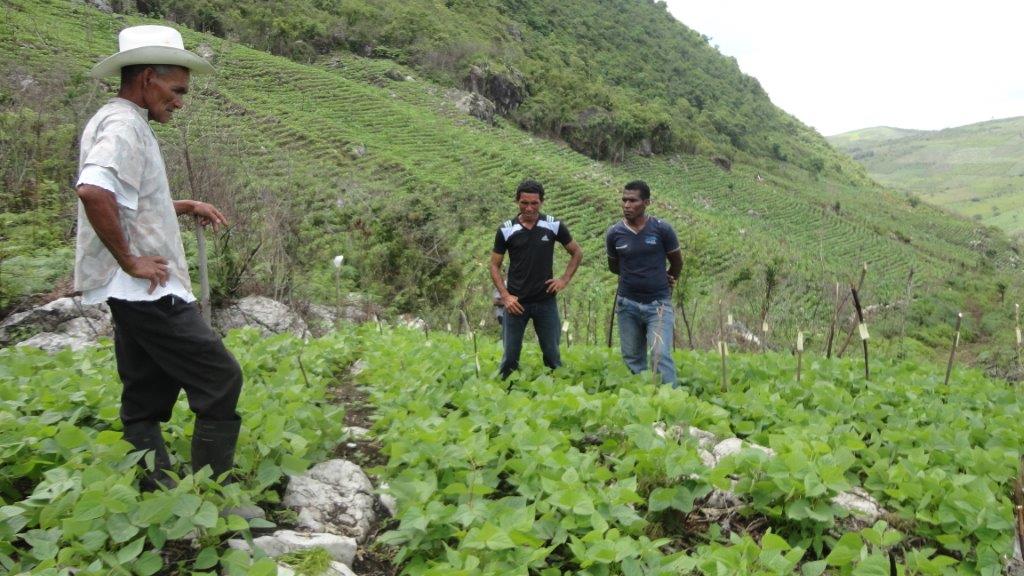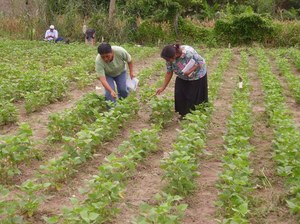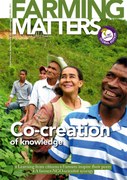Farmers are plant breeders when they select and save the seeds of the plants best adapted to the conditions in their fields. For over two decades, farmer breeders in Honduras have been working with scientists and NGOs to develop new bean varieties. In a context of high agrobiodiversity, limited public sector agricultural research capacity and extension services, the process has not always been smooth. Against all odds, this collaborative effort, which has brought scientific knowledge together with farmer knowledge, has positioned farmers at the forefront of innovation for climate change adaptation. This article highlights lessons learned over 20 years about the power of knowledge co-creation.

‘Amilcar’ is the name of a farmer and of a new variety of bean. The variety, which is praised for its excellent culinary properties, was identified by Amilcar’s wife at an early stage of a bean trial and then improved by Amilcar with the support of researchers. Using genetic marker technology, Zamorano breeders subsequently identified a line of the Amilcar variety that is resistant to bean golden yellow mosaic virus. Disease-resistant Amilcar seed has become a regional commercial success. For Amilcar the farmer, the bean variety is a source of personal pride because it is highly appreciated by his community.
Participatory Plant Breeding
The economic contraction in Honduras during the 1980s led to a decline in agricultural research and the disappearance of agricultural extension from public sector services. This left the private and not-for-profit sectors to deliver fee-based extension services. These were inaccessible to most family farmers cultivating the steep, marginal hillsides of north-central Honduras. It is these farmers who are most vulnerable to climate change-related food insecurity. Honduran hillside farmers have selected their own seed for countless generations without knowledge of more formalised breeding methods. Farmers select for steady yields, but these also tend to be low. In 1993, the International Centre for Tropical Agriculture began to train local teams of farmers in research skills in ‘Local Agricultural Research Committees’ known as CIALs for their Spanish acronym (Comités de Investigación Agricola Local). Shortly afterwards, two local NGOs, the Foundation for Participatory Research with Honduran Farmers (FIPAH) and the Program for Rural Reconstruction (PRR), started to support this initiative through their own programming. In 2000, in collaboration with the Pan-American Agricultural School (Zamorano), scientists at Zamorano and NGO agronomists began to specifically focus the CIAL research on participatory plant breeding. Since then, this research initiative has snowballed into a farmer NGO-scientist synergy that has both made a place for itself in the regional seed market and become indispensable to the country’s research network.
Innovative processes emerge
It is the synergy between farmers, NGOs, and scientists that provides added value to the breeding process
The CIAL research process begins with a participatory diagnosis and ranking of local agricultural problems, which CIAL members decide to address. Experiments take the form of controlled trials in which farmers compare different varieties on their farms. In participatory plant breeding, farmers collaborate with scientists at Zamorano, who may either cross a popular local bean variety with an improved one at farmers’ request, or scientists provide farmers with advanced lines of unreleased materials to choose from. CIAL members, trained in participatory research by NGOs, have learned formal selection techniques allowing them to conduct successive selections on their farms. In order to ensure adaptation to local conditions, new varieties are screened first on a very small scale before selected varieties are tested on a larger scale and finally, successful varieties are propagated. To date, the partnership between Zamorano, NGOs, and CIALs has led to the development of 23 new bean varieties.
Institutionalised co-creation
Often, the participatory plant breeding process shows differences in the criteria used by farmers compared to those typically chosen by the scientific community. For farmers, taste and early maturation play an important role in the selection, whereas breeders generally seek to improve disease resistance, yield, and architecture. By engaging in joint research, farmers and scientists have succeeded in developing varieties that are more adapted to farmers’ needs and conditions, increasing the adoption rate of new beans and reducing the time between research and dissemination of materials.
Research support must be sustained over the long term in order to allow for trusting partnerships to evolve between the different players
This experience has shown that when farmers are put into the driver’s seat and provided with the tools to conduct formal research, they successfully develop the varieties that most suit their needs. This is evidenced, for example, by the selection of drought-tolerant and shorter maturation varieties that do well in poor hillside soils and help farmers ‘to escape the drought’. Additionally, those participating in the program use agroecological management approaches, including making and integrating natural fertilisers and pesticides, as well as introducing greater crop diversity into their fields. As a result, they have managed to substantially reduce ‘los junios’, the hungry period. The CIALs benefit from the strong local demand for varieties generated through participatory plant breeding by the region’s farmers, creating an economic incentive for participatory plant breeding research. Individual actions that lead to innovation, such as the selection of locally suitable varieties, are also motivated by collective values that come from being part of a CIAL and the prestige gained from sharing new varieties with family and friends.
Lessons learned

Typically, agricultural research has characterised farmers as passive recipients of aid rather than mainstays of their own research agendas. Conventional plant breeding is usually supply-driven: new varieties are released without knowing whether or not farmers like them. This mindset not only devalues local knowledge, but also increases existing differences in power relations between farmers and researchers. Participatory plant breeding on the other hand, is demand-driven. In Honduras, giving skilled farmer researchers an important role has not only benefited the formal scientific sector, but has also achieved a fundamental shift away from the top-down model of conventional breeding of the past.
As the Honduran experience shows, participatory plant breeding is not simply adaptive research where farmers fiddle with breeders’ materials. In this context, it is the synergy between farmers, NGOs, and scientists that provides added value to the breeding process. The experience described here underlines the potential of farmer-centred approaches to support climate change adaptation and mitigation. The diversity of varieties created through participatory plant breeding puts them at the cutting edge of climate change adaptation. It also shows us that research support must be sustained over the long-term in order to allow for trusting partnerships to evolve between the different players. Moreover, to incentivise farmers’ long-term engagement in participatory plant breeding research, seed regulatory systems must allow for the development of small seed enterprise.
Sally Humphries, Juan Carlos Rosas and Marvin Gomez
Sally Humphries (shumphri@uoguelph.ca) is Associate Professor at the Department of Sociology and Anthropology at the University of Guelph, Canada.
Juan Carlos Rosas (jcrosas@zamorano.edu) is Professor of Genetics and Plant Breeding at the Escuela Agricola Panamericana, Zamorano, Honduras.
Marvin Gomez (marvincernapm@yahoo.es) is an agronomist with the Foundation for Participatory Research with Honduran Farmers (FIPAH). He is USC Canada’s project head in Central America.


